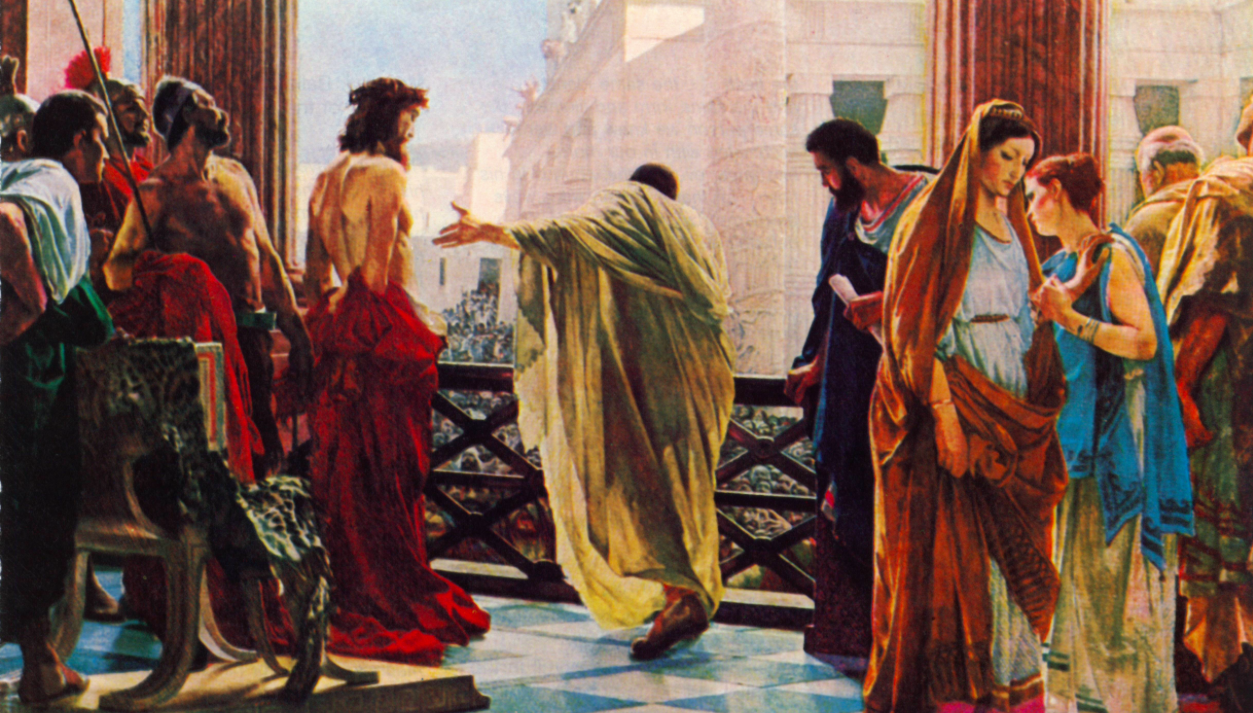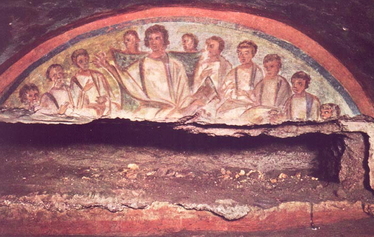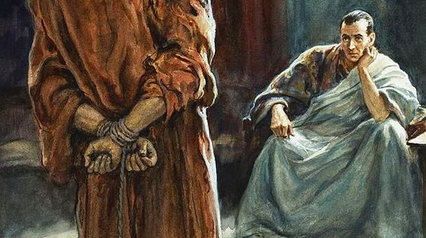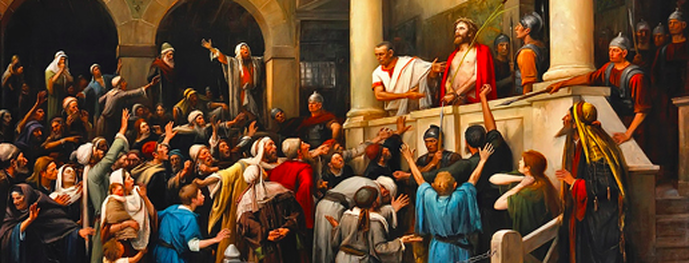|
I have come to the end of my study and preparation for a sermon on the John 18-19 episode of Jesus before Pilate. Here are some final thoughts: In the final scene of this Passion-week episode our attention is drawn to Pilate’s last question. He could find no guilt in Jesus, “Shall I crucify your King?” This question sets up the statement of all adamic statements: “We have no king but Caesar!” The Jewish leaders themselves had become frustrated with Pilate and, so, they turned to the clincher of their argument for doing away with this Jesus–they made it all about Caesar. They do what the world always (and the church, all too often) does: they change the characters in the judgment hall. They put Pilate before Caesar rather than Jesus before Pilate. The Jews set Pilate up, for when “Pilate sought to release him” (19:12), the Jews cried out, “If you release this man, you are not Caesar’s friend. Everyone who makes himself a king opposes Caesar.” And in their last breath, the words that confront us all, Pilate was done—out-done: “We have no king but Caesar!” The ironic thing, the Jewish leaders didn’t want to defile themselves by going into Caesar’s Jerusalem judgment hall, yet they had carried Caesar in their hearts, leaving them most defiled and guilty at their very core before God. As he had tracked the Jewish leaders and Pilate down to that very moment, Jesus puts every listener of this story, every church, all of us on trial. Who is your king? But I don’t want to leave this here before the individual—which of course you must decide who is your king? —but I think we need to go right to the listeners of this in its original setting and see how this all works for church, for the gathered-church. This scene parallels the church’s social-religious-political-civil setting—as Jesus was on trial so is the gathered-church—not just for judgment, but to affirm their allegiance, for encouragement, despite all appearances to the contrary, Jesus is king! This scene is good news to the church!
0 Comments
 The passion week scene of Jesus and Pilate has provoked many thoughts for me as I prepare for this year's Easter season. I mentioned in a previous post that we ought to identify with the readers of this story and listen closely as they would have to John's telling of this story, and in particular the scenes of Pilate and Jesus (in John 18-19). This scene was an answer to them, as it still remains an answer for us, this is how things change–this is God's way to change the world, destroy powers, and save humanity (our friends, family, and neighbors, even our enemies). Looking to Ephesians for a moment: I am persuaded that the Gospel of John was written by John in the Ephesus area and its first audience was the gathered-churches throughout western Asia Minor (similar as Paul's Letters to Ephesians and Colossians). So, I start with Ephesians. Most take Paul’s Ephesians letter as an issue-less document (e.g., no real problem in the church) and crafted in such a way to address the church universal rather than the church local. Nonsense. Absolute nonsense. The Letter was written to the local churches—ye, household gathered-churches—throughout western Asia Minor . . . and given Ephesian's highly liturgical and hierophany-like nature, its temple-ish and sacred space framing . . . I take the issue to be: the gospel had so penetrated into the Gentile world that former pagan-temple worshippers entering into church fellowship needed to learn a new temple-life as church, something wholly different that there temple life in Roman, pagan culture and society. In this case, a gathered church that looked and felt more like a living room filled with unequal strangers, wives and husbands, children and slaves, and extended family . . . than a theater-like building with mostly equals sitting in pews . . .  What would this scene, Jesus before Pilate, mean to the young church of mostly former (and some, for sure, still) temple-worshipping Gentiles and a number of Greek-speaking diaspora Jews living in western Asia Minor? We must acknowledge and grasp that there is no New Testament analogy for what we do on a Sunday morning. We’ve exchanged someone’s dining or upper room in the greater Ephesus or perhaps Laodicean region for a theater-like building that Caesar (now) sanctions. We have exchanged a meal, a diepnon or supper, with the broken break shared at the beginning of the meal to signify all those gathered at table were in Christ, a family, made one because of Jesus’ broken body on that criminal’s cross (cf. Eph 2:11-22) and where a cup would be raised after the meal (cf. Luke 22:20) to honor, not Caesar or a household deity, but the resurrected treasonous-traitor, Jesus, the real and only King of kings and Lord of lords, the One standing before Pilate–all exchanged for tokens and symbols rather than a gathered-church of unequals and strangers, poor and wealthy, beggars and doctors, the discarded and the elite, the temple prostitute and the patron, slaves and masters, orphans and male child-heirs, girls and children of slaves, women and men . . . this was the way to destroy the gods of the Greco-Roman empire and to topple a Caesar. There was only one king in that judgment hall. The one wearing a crown of thorns, bloodied by a criminal's beating, fist marks on his cheeks, in a mock purple robe. You see, we hear the passion-week inquisition where Jesus stood before Pilate with strange ears to the story . . . but . . . hear again we must . . . again, differently . . . we must cry out, 'We have no king but Jesus!' and abandon all our idolatries and allegiances to the kings and powers of this world. As it was for those early gathered-churches in western Asia Minor, so still for us: this is how God destroys the powers and changes everything. All the Wasted Passion Week Thought blogs >> Click Here
Wasted Passion Week Thoughts: It is all too natural to cry out, "Crucify Him! Crucify Him!"3/1/2018  The Passion Week is soon upon us and as I prepare my Passion Week set of sermons, here are some thoughts from John 18-19: The Passion Week scene in that judgement hall with Caesar’s paper proxy, Pilate, and the Lamb of God silent before his shearers, puts us all on trial. Everything about that scene cries out, “There is no king but Jesus!” Yet, we are shocked to hear ourselves shout out of our own mouths, “Crucify Him! Crucify Him! We have no king but Caesar!” Caiaphas, the crowd, the Jewish leaders, even Pilate thought they were each using Jesus as a pawn in their own political, religious, and power game of chess. None of them realize that their own plays of power and ambitions were being used by God to save humanity. As Jesus had tracked the priests, the crowd, and Pilate down to that very hour, He puts every reader, every listener of this story, us all, on trial. Don’t think or rationalize for a moment that we would have been any different. “Crucify Him!” is the shout of every heart that craves even the smallest token of power to save or to protect our own lives. Can we really say, “We have no king but Jesus?” Hardly. Like the duplicitous priests who handed Jesus over to Pilate so he would do their dirty work and get rid of Him, yet they do not want to go into the judgement hall for fear of being defiled—they did’t want to spoil their religious appearance at holy Passover. What a joke, laughable behind all imagination. We, too, want to look holy, undefiled, yet everything about us is already unclean, for we, too, want rid of this Jesus where it counts and cling to every possible king or power other than Jesus. We show our allegiance every chance we get, while attempting to look pious and spiritual, to other kings—any other king but Jesus. Do not think this is all of the powerful or the well-positioned. There is that crowd. They were the one’s shouting, “Crucify Him! Crucify Him!” Each one of us, each reader-hearer before this story, are quick to align ourselves with almost any relevant, expedient power to get what we need, what we desire, what protect ourselves, what maintains our spot, even our little, tiny spot. Yet, as Christians standing before this godawful scene (it's all backwards), we are not here so we can save Israel or to leverage any feigned appearance of allegiance to Caesar—no, not at all: we are not here to save America, save our party, save our stake of ground; we are not here to align ourselves with any party we may think we need to protect our way of life, to maintain our piddly sense of power. No. For we would no sooner cry out “crucify Him!” to protect our personal stake and space in this drama and would gladly feign allegiance to any king that will save our asses when are asses are on the line, when our lives depend on bits of our culture for protection, for status, for riches and for power, for our small plot of ground. Hail Caesar is quite easy. And the cry, “Crucify Him! Crucify!” is all but too natural. Why we are all on trail in that judgment room where Jesus stands before Pilate. There is no king but Jesus. All the Wasted Passion Week Thought blogs >> Click Here
|
AuthorChip M. Anderson, advocate for biblical social action; pastor of an urban church plant in the Hill neighborhood of New Haven, CT; husband, father, author, former Greek & NT professor; and, 19 years involved with social action. Archives
February 2024
Categories
All
|
Pages |
More Pages |
|

 RSS Feed
RSS Feed